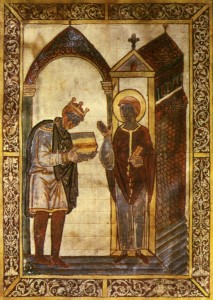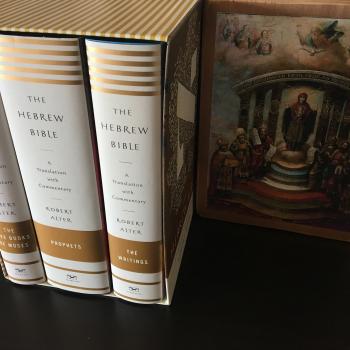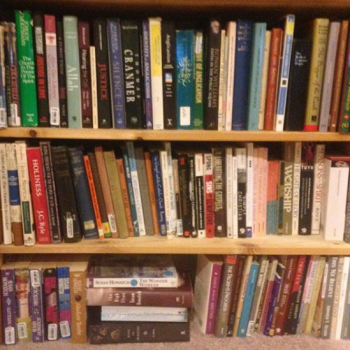
There is a certain church popping up repeatedly on my news feed advertising a church service that will potentially reach the downtown of the city in which I live. It is an Anglican church, or more precisely put, it is a church that thinks it’s Anglican because it likes liturgy but doesn’t want to become Anglican-extreme, as evidenced by its pastor’s theological blogs on the ‘misconceptions of Anglicanism’ and the ‘dangers of Anglicanism.’ The bottom line of these posts is that Anglicanism has been misconstrued as a ‘man-made ritual,’ which means that in many quarters, it’s lost a sense of the Christian Gospel, which (apparently) is to actively seek to transform the nations with the message of Jesus, which (apparently) ‘is an invitation to turn away from laws and threats, and to believe that Jesus paid it all’ in contrast to a Caesarean existence based on ‘laws and threats.’ Not only is this church seeking to change my city’s culture, but it boldly states on its vision statement that the reason my city is dying because of racism, sexism, and drug abuse, and that the church is failing to address these issues because the Protestant church in my city is numerically shrinking:
The church should be a part of the solution, but it is rapidly dying. In the last survey conducted by Statistics Canada, only 17% of the population in Vancouver consider themselves Protestant and 42% have no religious affiliation.
The suggestion is thus that mainline churches (like Anglican ones) have become so institutionalized and routinized that they’re losing the young people, so not only is this new church going to resurrect my city, but they’re going to tell us Anglicans how we’ve majorly screwed up.
I don’t blame them, as my city is also one of the three fault lines of the Anglican Communion crisis, that is to say, one of the three dioceses in North America where direct actions from the bishop (mostly to do with sexuality) have caused churches to split from the province, seek cross-provincial episcopal jurisdiction, and cause major schism within the worldwide Anglican Communion. This new church seems to have the solution to our problems, of course. Instead of focusing on Anglicanism as the church structure and the man-made rituals, we should rediscover this cool articulation of faith called the liturgy. We should also lay claim to our theology in the Thirty-Nine Articles, which is (obviously) the Anglican statement of faith, just like (duh) every Protestant church has a statement of faith, because (of course) Protestantism is confessional. In fact, Anglicanism is a great missional strategy to reach ‘postmodern’ people because its liturgy is so poetic, and it gives certainty in its theological articulation to an uncertain world. In turn, reaching people strategically will turn the church into a ‘capital base’:
…new churches also become resource bases for all other ministries. Most other independent or para-church ministries need ongoing financial resources, year after year. Once a new church becomes self-supporting it becomes the capital base (manpower, ministry expertise and money) for all other ministries within the city. If it is healthy and continues to grow it becomes a viable and vital partner in building other necessary, specialized and cutting edge ministries within the city. So, if we plant a church we can impact the city and world on a larger scale.
Never mind, of course, sociologist Nancy Ammerman’s analysis in Pillars of Faith that it’s usually parachurch organizations that make the money for congregations. Never mind also that despite the depiction of Vancouver as unclaimed, de-Protestantized territory, there are churches in my city like Tenth Church, Grandview Calvary Baptist Church, and First Baptist Church that are already pulling their share of the weight. This still sounds very nice.
It’s also a profound teaching moment about Anglicanism that is difficult to pass up. And so I shan’t. Let me begin with a question:
Is Anglican liturgy actually strategic? In other words, can you build the church as a capital base with a liturgical strategy?
This is an honest question, partly because many evangelicals nowadays absolutely (and “passionately,” of course) think so. In fact, it’s an increasingly pressing question because the last ten-ish years have witnessed a great awakening among evangelicals regarding something to which evangelicals claim Anglicans have special privilege among Protestant Christians: liturgy. (Never mind that Lutherans, United Methodists, Presbyterians, Baptists, and other Free Church derivatives have all sorts of liturgical traditions too.) Having read the late Robert Webber as well as a few cool new books on “the grammar of faith” while discovering that the guys they love to quote were Anglican (e.g. C.S. Lewis, John Stott), Anglicanism’s “Catholic tendencies” are starting to become cool, poetic, hip. In fact, it may be the mark of the new Christian hipster, that is to say, the portrait of the young Christian as a hipster.
Now, of course, James K.A. Smith writes some pretty cool stuff about liturgy informing everything you do. But this new liturgical fetish weirds me out a little because it’s a bit selective. I mean, you don’t see any evangelicals who have read radically orthodox theologian Catherine Pickstock’s After Writing going off and using the Tridentine Latin Mass as an evangelistic strategy (or maybe Pickstock’s writing is too impenetrable for those working with that scandal called the ‘evangelical mind’). And, of course, within Anglicanism, there are all sorts of liturgies. There’s the established form from the 1662 Book of Common Prayer, but unless you’re at my church where people are actually convinced that the poetry of phrases like “it is meet and right so to do” will win people to Christ (while being simultaneously confused as to why there are so many white people at our church), unintelligible language isn’t exactly a marketing strategy (besides the small detail that in Article 24 of the Thirty-Nine Articles, it’s ‘plainly repugnant’ to have a liturgy ‘in a tongue not understanded of the people’). If you want a liturgy ‘understanded of the people,’ you could look to the Book of Alternative Services, but then, the 1662 people will get you for going liberal.
Which, in short, means that when you use Anglican stuff, there are Anglican politics to deal with.
That leads to my next question: is liturgy all there really is to Anglicanism?
Let me submit to you that Anglicanism isn’t really about the liturgy, but rather, all about this dirty word ‘politics.’ Don’t ever forget that the Protestant version of Anglicanism started in the sixteenth century when this sexist king called Henry VIII wanted to get a divorce from his wife, which in turn led to his next wife getting beheaded, the next one dead in childbirth, the next one divorced because she couldn’t speak English (true story), the next one beheaded too because she cheated on him, and the last one survived because, in 007’s words, she was the ‘last rat standing.’ Then the king died, which led to all sorts of problems because half the royal family wanted to become Catholic again (so they killed all the Protestants) and the other half wanted to become Protestant (so they killed all the Catholics), until Elizabeth I came around, decided she liked the Protestant version because it made her (as opposed to the pope) ‘Supreme Governor’ of the Church of England, and achieved what’s called the ‘Elizabethan Settlement,’ which meant that we got a prayer book, a few anti-Catholic diatribes, and a state-sanctioned Protestant religion.
And that leads to my next question: do you really have to deal with all of that junk as a missional church?
Uh, yeah, you do, because when it comes down to it, what this means is that there’s really no such thing as ‘Anglican theology,’ or even ‘Anglican liturgy,’ for that matter. Don’t get me wrong: I’m not saying that we don’t have theologies and liturgies; I’m saying that there are too many of them. There are multiple Anglican theologies and liturgies in conversation (often heated ones) among Anglicans around the world. In technical terms, we call this mess the Anglican Communion. There are evangelicals who actually don’t like the liturgy that much (surprise, you evangelical liturgical entrepreneurs!), there are Anglo-Catholics who like the liturgy too much, there are latitudinarians who don’t really seem to care about liturgy and theology, and there’s every possible combination, permutation, contradiction, and exception to all of the above. We all made a show of getting along when the United Kingdom had this thing called an empire where folks who were technically Anglicans colonized the entire world (which is why the sun never went down on the British Empire), and when that empire fell apart due to budgetary reasons, we called it a communion of provinces, which sounded nice until some of the provinces wanted to bless same-sex unions and ordain gay clergy, which made some of the ex-colonial provinces excommunicate the more liberal provinces, which in turn made some conservative parishes drop out of the old provinces, which in turn has caused a ginormous mess about property rights, which in turn has led to a boiling animosity that has culminated in the voting down of an ‘Anglican Covenant’ that was the last ditch effort to keep the whole thing together.
Which leads to: what really makes you Anglican, then?
What really makes you Anglican is that you plug yourself into this complete mess of a conversation called the Anglican Communion and people in this mess recognize you as plugged in, talk to you as Anglican, and insult your version of Anglicanism.
Great, so do you get to say that you’re just in this conversation?
No. First off, if you’re already a baptized Christian, you find a bishop who likes you (politics, right?). Then you get confirmed with the guy/gal (depending on what you think of women bishops), which is good enough if you want to be a lay person in this conversation. If you want to serve the sacraments, you have to get ordained twice (deaconed, then priested). This process allows you to trace your Christian food chain back up to Augustine of Canterbury.
Who that?
Not to be confused with his namesake from Hippo, Augustine of Canterbury was a Catholic missionary sent to the British Isles by Pope Gregory ‘the Great’ I, who made the evangelization of Britain one of his top priorities because he saw some slave boys earlier on in his priestly career who were described to him as ‘Angles.’ He thought they looked so beautiful that he called them ‘angels’ (true story), so when he became pope, reaching them with the Gospel was his top priority. Augustine got there, got into major conflict with the existing pagan tribal leaders, managed to convert a few anyway, and started a primatial church at Canterbury that ordained priests and consecrated bishops in the effort to evangelize the island. The trouble was, there were already Christians there before Augustine, and they had also started monasteries (which, incidentally, had much earlier produced a guy called Pelagius that the other Augustine didn’t really like), so there was a lot of conflict between those pre-existing British Christians and the new Roman guys over how the church should operate as a communion. You can read all about the sordid details in Bede’s Ecclesiastical History of the English Peoples. They managed to sort it all out (sorta) when the British Christians finally agreed to adjust their Easter date to Rome’s.
In other words, these guys were Anglican Christians because they were a church among this group of people that Gregory liked who were called the Angles, who were in turn collaborating with and at war with other tribes (Saxons, Picts, Scots, Welsh, Irish, etc.) over British Isle turf.
Right away, then, you can see that Anglicanism wasn’t pretty from the get-go. There were conflicts between Christians, and there were conflicts between Christians and pagans, which became conflicts between the Christian church and the state. Some Anglican Christians (like Alcuin of York) eventually worked for the state. Some (like Anselm of Canterbury and Thomas Becket) pissed the state off. The state itself pissed itself off, which meant that there were all sorts of colourful wars fought around which dynastic line got to control the state (you know, the Normans, the War of the Roses, etc.). Eventually, these tensions boiled over when that Tudor king, Henry VIII, wanted to consolidate the state, so he straight up took over the church, which (as I said earlier) seemed to work and then didn’t, and then there were radical Puritan strands that tried to take over the Anglican Church and the state, which ended up turning into the not-very-pretty English Civil War and gave us the political theologies of Thomas Hobbes and John Locke. When the whole thing got settled, the one group everybody loved to hate were the Catholics, which became very inconvenient in the nineteenth-century when this thing called the Oxford Movement made Anglo-Catholicism a hit with their Tracts of the Times, and then pissed everyone off again when its major leaders (like John Henry Newman) jumped ship to Rome. Et cetera. Et cetera.
As you can see, there’s not much holding this beast called Anglicanism together, except for one thing: somehow, they can all trace their food chain back to Canterbury and the Gregorian mission, and even then, there were some churches and monasteries started before that mission which they had to whip into Catholic line. In other words, with the exception of having Canterbury as an ‘instrument of communion,’ nobody really agrees on much else. Even the Canterbury thing is fraying at the edges now, with the development of the Global Anglican Future Conference (GAFCON), a selectively ‘Global South’ Anglican configuration that styles itself as an alternative to the ‘broken instrument’ of Canterbury.
But because even the GAFCON people can technically somehow trace their food chain back to Canterbury, the technical term for the Canterbury thing is apostolic succession, that is, Anglicans are part of a church that through Canterbury and Gregory can trace their own food chain back to the apostles. Of course, when I say apostolic succession, I realize that I’m going to be drawn and quartered for completely missing the point of being a missional Anglican: ‘The post-Christian world doesn’t care about apostolic succession! You’re one of those religious scribes and Pharisees interested in the institutionalization of the church!’
Ignoring the fact that you got that criticism of institutionalization from Max Weber’s secular reading of the routinization of charisma and then conveniently imposed it onto your Scriptural exegesis (shhhhh…), let me suggest that apostolic succession is what makes Anglicanism ‘Anglicanism,’ and in turn, is what makes the whole thing Christian.
Why? you ask? Because Michael Ramsey says so.
Who that?
Michael Ramsey. Archbishop Michael Ramsey? (Does this mean that you don’t actually read Anglican theology?) Yes, actually, as a matter of fact, you should read Michael Ramsey, especially a little book he wrote called The Gospel and the Catholic Church, in which he argues basically that if you dump apostolic succession, you’ve dumped the Gospel. That’s right: lose the Catholic, and you lose the evangelical too, because (in technical theological terms) there is no kerygma without church. As Ramsey argues, if Jesus commanded his apostles to found churches, if you have churches apart from the apostles, then you lose their message too. You have to be able to trace your food chain back to the apostles in order to validate the message. The Gospel is attached to catholicity, and catholicity is attached to the Gospel.
Which brings us back to using Anglicanism as a strategy: it’s not a strategy. By some accounts, it’s barely even a Protestant denomination.
It is a mode of communion, in which–unlike most Protestant denominations that would see politics as dirty (ewww…) and church politics as the worst of politics–we Anglicans see that dirty work as an integral part of our Christian lives.
Let me repeat myself: instead of running away from church politics, Anglicans treat church politics as Christian business as usual. Church politics doesn’t come from a ‘misconception’ of Anglicanism, it is not the ‘danger’ of Anglicanism, and it is not merely ‘man-made.’ It is Anglican Christianity.
This is why these issues have to be addressed. Unlike starting independent congregations where one could claim that what one does or says in the congregation should not be subject to the scrutiny of non-members (an argument that Jennifer Knapp famously pulled against evangelical detractors of her same-sex relationship), claiming Anglicanism puts us into very, very messy communion. It gets nasty. There’s name-calling, people get hurt, there’s backroom deal-making, there’s collusion with state and empire, there are radical movements contesting that collusion, there are charismatic people seeking direct access to God apart from the institution, etc. etc.
What it means to be Anglican is to have your Christian life formed in this mess. In fact, many of the most profound Anglican contributions to wider Christian theological reflection (that is, Christians who don’t trace their food chain back to Canterbury) has been formed by this political insanity. I once read in an introduction to Anselm’s work that despite all of his trouble with the state (exiled twice, poor guy), he never actually reflected on that experience in his theology, preferring rather to muse on metaphysical matters in classics like the Proslogion and Cur Deus Homo. I slightly disagree with that preface writer’s assessment. Instead of driving a wedge between theology and politics, this metaphysical reflection might actually be the way of dealing with nasty Anglican politics. I could go down the laundry list of Anglican thinkers for whom this category might apply–Bede, Anselm, Julian of Norwich, Margery Kempe, the author of the Cloud of Unknowing, Thomas Cranmer, Richard Hooker, J.C. Ryle, John Henry Newman, Dean Inge, Charles Gore, William Temple, C.S. Lewis, Austin Farrer, Michael Ramsey, Rowan Williams, etc.–all of whom did deep metaphysical work in tough political circumstances (and didn’t all agree with each other).
I have to reference The Cloud of Unknowing here because if you’re going to appeal to the Anglican liturgy, the one thing that does actually set the thing apart is the Collect for Purity that we read at every Eucharist service, which happens to be the epigraph to Cloud:
God, to whom all hearts are open, all desires are known, and from whom no secrets are hid, cleanse the thoughts of our hearts by the inspiration of your Holy Spirit, that we may perfectly love you and magnify your holy name, through Christ our Lord. Amen.
The Cloud of Unknowing then unpacks that, arguing that God is like this amorphous cloud you can never make sense of with sheer intellect. You can only pierce that cloud of unknowing with pure love.
Let me just postulate in turn that you never fully understand this unless you’ve been in the thick of ecclesial political contestation where your intellect just drives you mad and your best ideas still result in bloody conflict.
In short, Anglicanism probably isn’t a great marketing tool, if you’re trying to reach people with an authentic, unvarnished Christian spirituality in order to build a capital base. Anglicanism is religion for the dirty people, the scum of the earth, the scumbags that ‘this generation seeking authenticity’ love to hate for their hypocrisy and pretentiousness. If you want recent examples, our last Archbishop of Canterbury (whom I think did a fabulous job) was often lampooned as an elitist academic. Our current Archbishop of Canterbury (whom I think is also doing a fabulous job) is often called an elitist ex-oil tycoon. Both, if you will, are the scummiest of us Anglican scum. Incidentally, I’m proud of that, because if you really want me to articulate what ‘Anglican theology’ is, it’s being attached to a strand of the Christian church catholic coming down through Augustine of Canterbury whose political scars force its members to consider that the dirt of politics is precisely the place where we are transformed into the image of Christ. After all, it is only there where we learn to treasure the insight that love, not only our intellect, is the only way to pierce the cloud of unknowing. Join us only if you dare.















